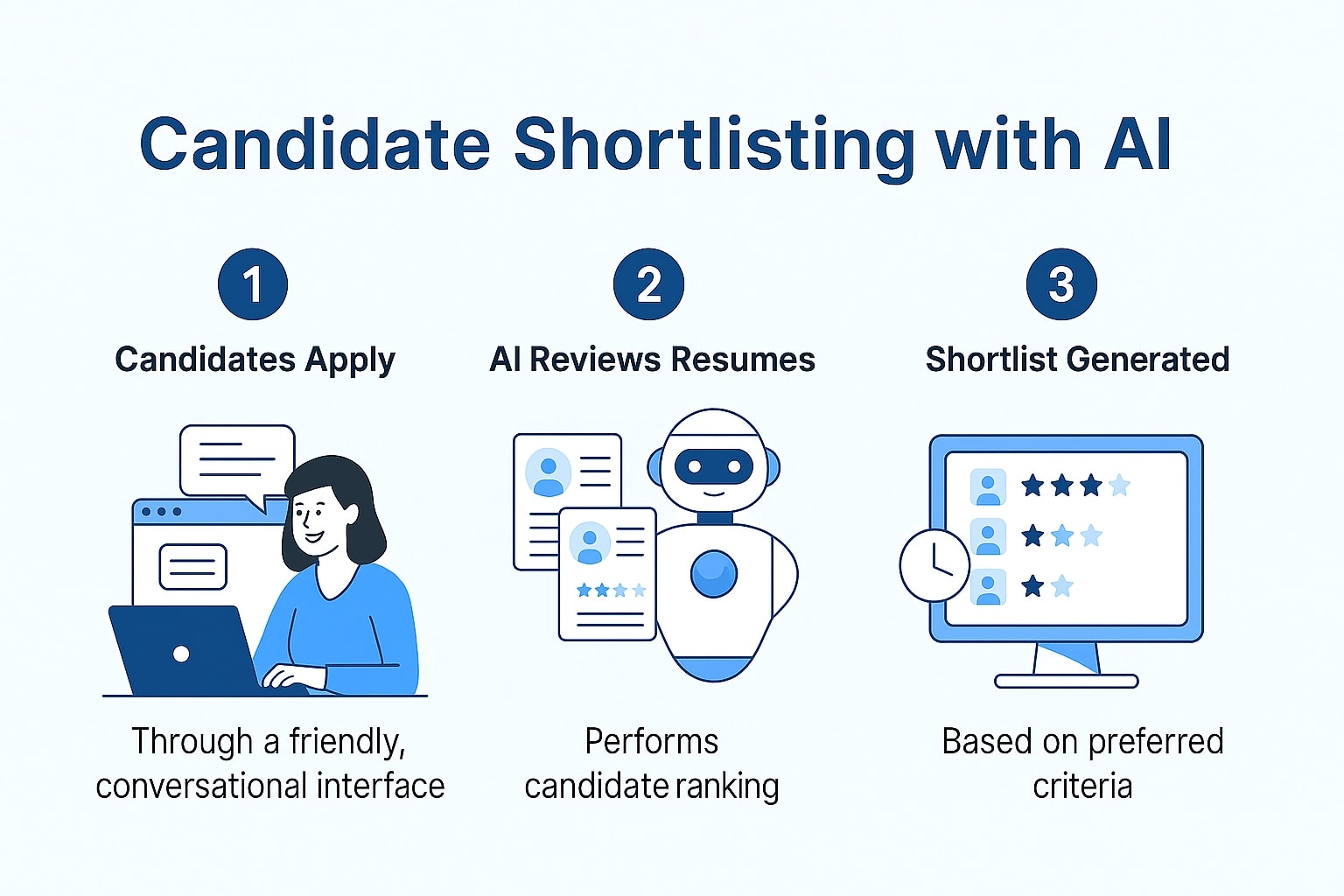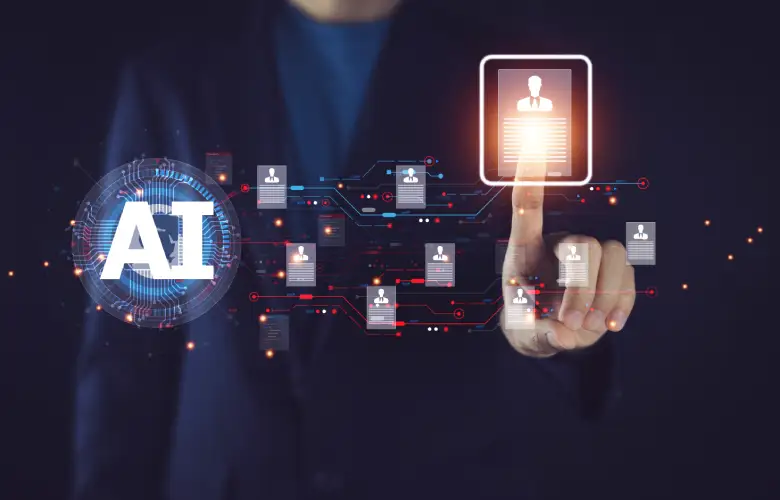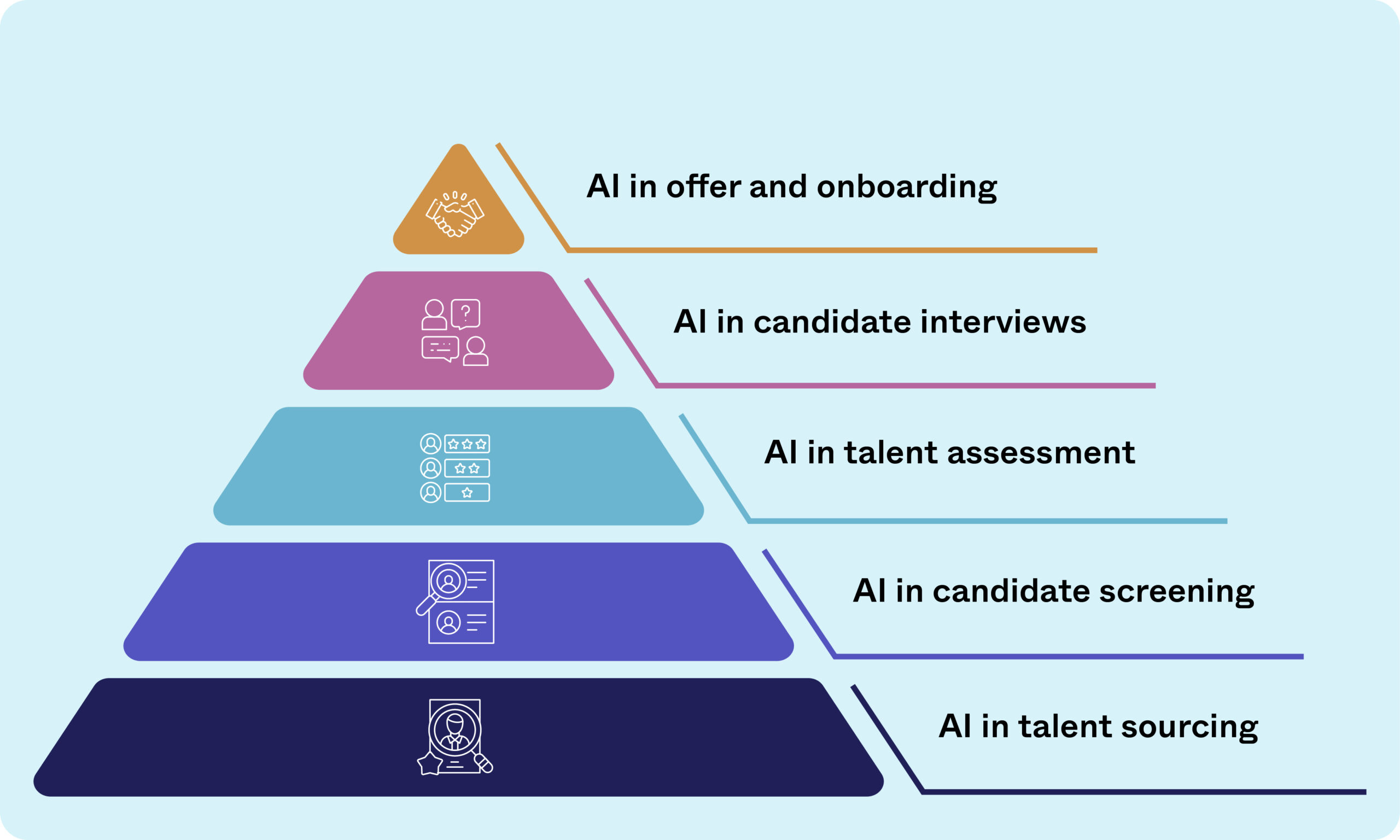AI-Based Candidate Ranking Trends Shaping Recruitment in 2025

AI is revolutionizing recruitment in 2025, offering unprecedented efficiency and inclusivity. With 44% of recruiters expecting AI to replace manual candidate screening, the shift toward automation is undeniable. By leveraging data-driven insights, you can streamline hiring while fostering diversity and fairness. AI empowers you to make smarter, faster decisions, transforming recruitment into a more equitable and effective process.
Understanding AI-Based Candidate Ranking

What Is AI-Based Candidate Ranking
AI-based candidate ranking uses advanced algorithms to evaluate and rank job applicants based on their qualifications, skills, and compatibility with a role. This process relies on data-driven recruitment methods to ensure objective and efficient hiring decisions. By analyzing large datasets, AI identifies patterns and matches candidates to job requirements with precision. For example, AI tools can assess resumes, compare them against job descriptions, and assign scores to prioritize the most suitable candidates.
A study titled Fairness in AI-Driven Recruitment highlights how AI addresses challenges like bias and improves fairness in hiring. Similarly, The Future of HR emphasizes AI's role in automating recruitment processes, reducing human error, and enhancing decision-making.
How AI in Recruitment Works
AI in recruitment automates repetitive tasks like resume screening and candidate sourcing. It integrates seamlessly into existing workflows, enabling you to focus on strategic hiring decisions. AI systems analyze thousands of applications in seconds, identifying candidates who best match job criteria. This process minimizes human bias and promotes diversity in hiring.
Methodology | Description |
|---|---|
Workflow Integration | Enhances recruitment processes by embedding AI tools into existing systems. |
Candidate Sourcing | Identifies and engages potential candidates through automated searches and outreach. |
Skills Matching | Matches candidate profiles to job requirements for better alignment. |
Interview Assistance | Analyzes video interviews to provide insights into candidate responses. |
Bias Detection | Detects biased language in job descriptions to promote inclusivity. |
Resume Screening | Quickly sifts through resumes to identify top candidates. |
Benefits of AI-Based Candidate Ranking
Streamlining Hiring Processes
AI-based candidate ranking saves time by automating repetitive tasks. For instance, AI tools can scan and analyze resumes faster than human recruiters. This efficiency reduces time-to-hire and allows you to focus on engaging with top candidates. Automating these processes also lowers recruitment costs by minimizing the need for third-party services.
Reducing Bias in Recruitment
AI eliminates unconscious bias by standardizing candidate evaluations. It ensures that all applicants are assessed based on data rather than subjective opinions. This approach fosters diversity and inclusion, creating a more equitable hiring process. AI also detects biased language in job descriptions, helping you attract a broader range of candidates.
Enhancing the Candidate Experience
AI-driven recruitment prioritizes a positive candidate experience. Automated systems ensure timely communication and personalized engagement. Candidates feel valued when they receive prompt updates and tailored feedback. This approach not only improves satisfaction but also strengthens your employer brand.
Key Trends in AI-Based Recruitment for 2025

Data-Driven Hiring Decisions
Data-driven hiring is transforming recruitment trends by enabling smarter and faster decisions. AI-driven recruiting tools analyze vast datasets to identify patterns and predict candidate success. Predictive hiring models, for example, use historical data to forecast which candidates are most likely to excel in specific roles. Real-time dashboards allow you to monitor key performance indicators like application conversion rates and hiring velocity. These tools provide actionable insights, helping you optimize every stage of the recruitment funnel.
AI also automates candidate matching by evaluating resumes based on skills, experience, and cultural fit. This ensures that only the most qualified candidates move forward in the hiring process. By leveraging these technologies, you can make informed decisions that improve efficiency and reduce hiring costs.
AI for Diversity and Inclusion
AI is playing a pivotal role in fostering diverse hiring practices. It eliminates unconscious bias by standardizing candidate evaluations and analyzing job descriptions for biased language. This ensures that all applicants are assessed fairly, regardless of their background. A recent report highlights how AI-driven recruiting enhances diversity, equity, and inclusion (DE&I) efforts by mitigating biases and promoting inclusivity.
Organizations worldwide are increasingly relying on AI to improve recruitment outcomes. As of 2019, 88% of companies were already using AI in some form for hiring. By adopting AI-powered tools, you can create a more equitable hiring process that attracts a broader range of candidates and strengthens your employer brand.
AI in Remote and Hybrid Hiring
The rise of remote and hybrid work has made AI indispensable in recruitment. AI-powered virtual interviews and onboarding processes streamline hiring across regions, saving time and resources. Companies using automation report a 30% reduction in time-to-hire and a 25% improvement in candidate experience. Tools like Salesforce's Einstein have also increased productivity by 30%, allowing you to focus on strategic tasks.
AI simplifies routine tasks, such as scheduling interviews and screening resumes, reducing the workload for HR teams by up to 40%. This efficiency ensures that you can connect with top talent, regardless of their location, and provide a seamless hiring experience.
Predictive Analytics in Recruitment
Predictive analytics is transforming how you approach hiring by using data to forecast outcomes. This recruitment technology relies on historical data and advanced algorithms to predict candidate performance and fit. By analyzing patterns, you can make more accurate hiring decisions and reduce turnover rates.
You can also use predictive analytics to enhance candidate selection. AI-driven tools analyze historical hiring data to identify patterns that lead to successful hires. These tools can forecast which candidates are likely to accept offers and thrive in their roles. By leveraging this recruitment technology, you can focus on candidates who align with your organization's goals.
Predictive analytics doesn't just improve hiring accuracy; it also saves time and resources. Algorithms can quickly evaluate large datasets, allowing you to prioritize the best candidates. This efficiency ensures you stay ahead in a competitive job market. Additionally, predictive models help you anticipate workforce needs, enabling better planning and resource allocation.
Incorporating predictive analytics into your recruitment process empowers you to make data-driven decisions. It enhances your ability to identify top talent, reduces hiring risks, and improves overall efficiency. As you adopt this technology, you position your organization for long-term success in a rapidly evolving hiring landscape.
Practical Applications of AI in Candidate Ranking

Automated Resume Screening
Automated screening powered by AI has transformed how you evaluate resumes. AI recruitment software can analyze thousands of applications in seconds, identifying top talent based on skills, experience, and qualifications. This process eliminates manual errors and ensures that only the most suitable candidates move forward. For example, companies like Google and L'Oréal have successfully implemented AI-driven tools to streamline their hiring processes. Google’s AI platform reduced time-to-hire by 20%, while L'Oréal improved candidate satisfaction by 33%.
Company | Objectives | AI Solutions Implemented | Results |
|---|---|---|---|
Streamline the recruitment process and identify high-potential candidates efficiently. | AI-powered platform 'Hire' for automation of scheduling and candidate communications. | 20% reduction in time-to-hire, increased retention rates, enhanced recruiter productivity. | |
L'Oréal | High volume of applications and need to improve candidate experience. | AI chatbot 'Mya' for initial interviews and candidate queries. | 33% reduction in time to hire, improved candidate satisfaction, decreased drop-off rate. |
Vodafone | Enhance quality of hires and promote internal mobility. | AI-driven talent management system with predictive analytics and video interviews. | N/A |
By leveraging automated screening, you can focus on engaging with top talent while saving time and resources.
AI-Powered Interview Assessments
AI recruiting tools have revolutionized interview assessments by enhancing accuracy and fairness. These tools evaluate candidates through performance-based methods, such as coding tests or writing assignments, to measure skills objectively. AI-driven screening also integrates human judgment, ensuring personalized and fair evaluations. Organizations using these tools report a 50% reduction in time-to-hire and a 75% increase in candidate engagement.
AI-powered assessments also reduce bias in hiring decisions. By focusing on data-driven evaluations, you can ensure that every candidate receives a fair opportunity. This approach not only improves hiring accuracy but also enhances the candidate experience by providing timely and transparent feedback.
Personalized Candidate Engagement
AI usage in recruitment has made candidate-driven recruiting more effective by personalizing communication. AI-driven tools can tailor messages, schedule interviews, and provide real-time updates, ensuring candidates feel valued throughout the process. Companies that personalize their communication see a 40% increase in candidate engagement. Accenture’s AI platform, Amber, achieved a 50% reduction in time-to-fill for high-demand roles and a 40% increase in positive candidate feedback.
Enhancing candidate experience through personalized engagement strengthens your employer brand and attracts top talent. By using AI to create meaningful interactions, you can build trust and foster long-term relationships with candidates.
FAQ
Who is Moka HR?
MokaHR is a leading provider of AI-powered recruitment solutions, dedicated to empowering enterprises throughout the hiring journey.Trusted by over one million HR professionals, MokaHR delivers intelligent automation, data-driven insights, and scalable platforms that enable organizations to accelerate recruitment, enhance decision-making efficiency, and advance digital transformation in talent acquisition.
What is the main purpose of AI-based candidate ranking?
AI-based candidate ranking helps you identify the best candidates for a job by analyzing their skills, experience, and compatibility. It uses data-driven methods to streamline hiring, reduce bias, and improve decision-making. This ensures you find the right talent faster and more efficiently.
How does AI reduce bias in recruitment?
AI reduces bias by standardizing evaluations. It focuses on objective data, such as skills and qualifications, instead of subjective opinions. For example, AI can detect biased language in job descriptions and suggest neutral alternatives, helping you create a fairer hiring process.
Is AI recruitment safe for candidate data?
Yes, if you use secure AI tools. These systems follow strict data protection policies to safeguard personal information. Always choose platforms that comply with privacy regulations like GDPR or CCPA. This ensures candidate data remains confidential and protected from breaches.
Can AI improve the candidate experience?
Absolutely! AI enhances the candidate experience by providing timely updates, personalized communication, and faster responses. For instance, chatbots can answer questions instantly, while automated systems ensure candidates receive feedback promptly. This makes the process smoother and more engaging for applicants.
Do HR professionals need special training to use AI?
Yes, training is essential. You need to understand how AI tools work, interpret data insights, and address ethical concerns like bias. Investing in AI training ensures you can use these tools effectively and responsibly, maximizing their benefits for your recruitment process.
See Also
Harnessing AI Tools to Forecast Candidate Performance Effectively
Enhancing Candidate Experience Through Innovative AI Recruitment Tools
Transforming Talent Acquisition with Advanced Online AI Recruitment Systems
Influence of AI Recruitment Software on Today's Hiring Methods
Improving Recruitment Clarity with Effective Applicant Tracking Systems
From recruiting candidates to onboarding new team members, MokaHR gives your company everything you need to be great at hiring.
Subscribe for more information

